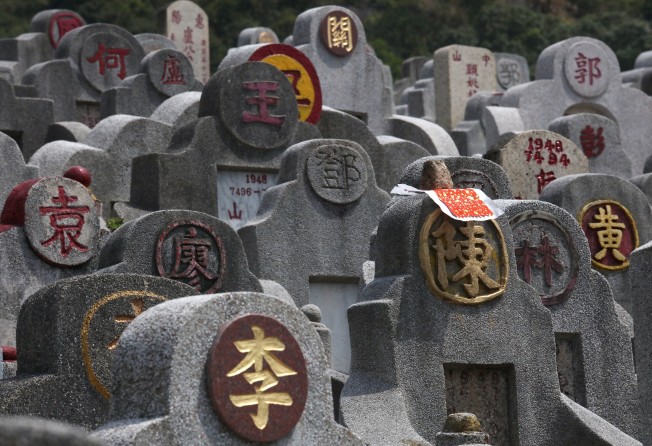This year, Hong Kong grave-sweepers have an added duty: keeping themselves safe from the coronavirus
- While little is known about the afterlife, it can surely be said that ancestors would always desire the well-being of their descendants

Weddings and grave-sweeping are among important family rituals in Hong Kong. Yet, both activities have experienced different degrees of disruption due to the coronavirus outbreak.
In view of the health risks of large gatherings, the Food and Health Bureau has suggested some changes to how people pay their respects to ancestors (“Offerings to ancestors to be centralised and burned in funeral parlour to cut crowds at private columbariums during Ching Ming Festival ”, March 13). Health officials have urged people to honour their ancestors online, but this has met with a lukewarm response, and it’s not hard to see why.
Many believers in traditional Chinese culture regard mourning on the internet as far from adequate for paying their respects to the deceased. Visiting graveyards or columbariums in person and praying before gravestones carry a symbolic meaning of renewing ties with ancestral spirits. A tradition many grave-sweepers follow is burning joss sticks and paper offerings as a way of honouring the dead and sending money and necessities to ancestors.
Although those who do not share the same belief in the afterlife may dismiss these as outdated practices, they should nevertheless respect the right of others to perform the rituals. In particular, the filial piety manifested should be lauded.
While little is known about the afterlife, it can surely be said that ancestors would always desire the well-being of their descendants. Therefore, to show genuine respect for ancestors, tomb-sweepers should take all possible protective measures to prevent themselves from falling ill.
Firstly, they should not flout restrictions on the burning of offerings in columbariums because semi-enclosed spaces can be breeding grounds for the coronavirus if virus-contaminated droplets are suspended in the smoke.
Secondly, we should avoid visiting cemeteries en masse around April 4, to minimise the risk of person-to-person transmission.
The true meaning of filial piety lies in how well we take care of ourselves.
John Ng, Lai Chi Kok